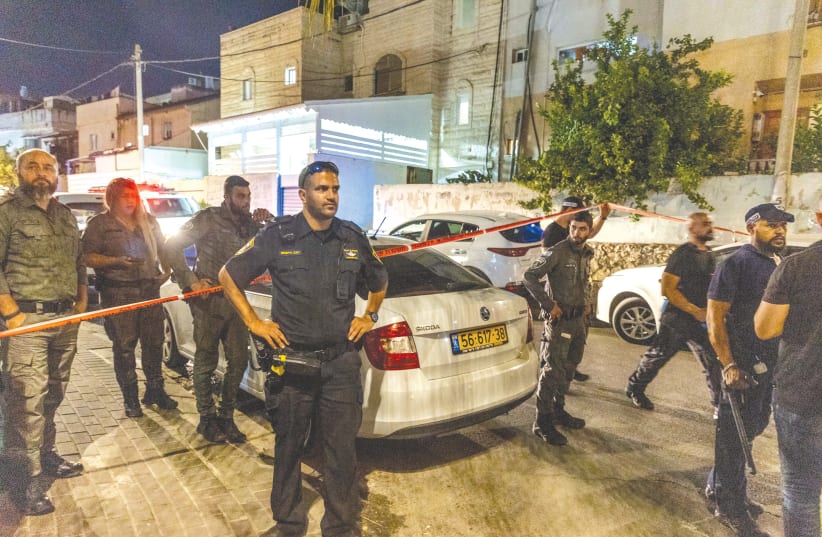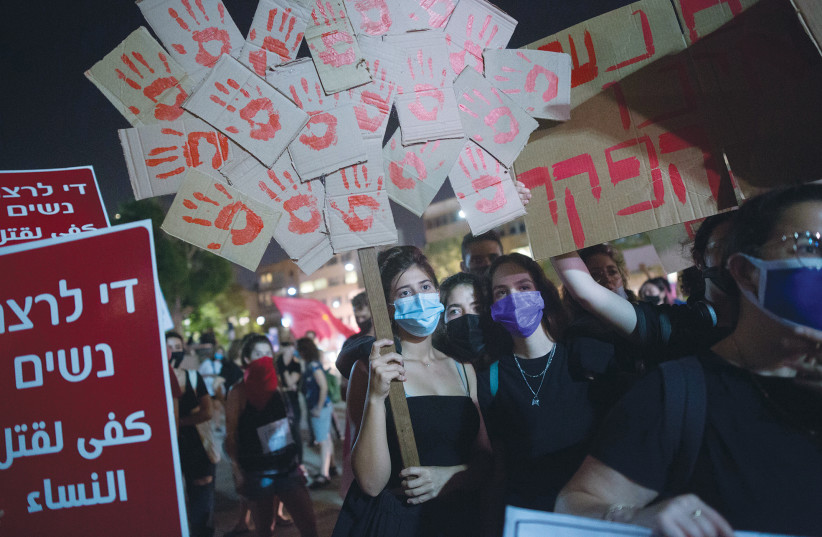Over the past few weeks, I accompanied my wife, Gil, on interviews she did in Arab towns and mixed cities for her PhD studies, and helped translate some of them from Arabic to Hebrew.
As someone who has covered Arab affairs, I always find it fascinating to see how much there is to learn about our neighbors, and how little we know about what bothers the Arab citizen in Israel.
But there was one issue that came up in every single interview: personal safety.
Violence and crime on Arab streets
Of a dozen interviewees we spoke with, not a single one skipped the topic of violence and crime on the streets of Arab towns and villages.
Each of them – old or young, men and women, city dwellers or villagers, religious and secular – said they had encountered situations in which they have felt unsafe, or exposed to violence in some form.
One business owner said he was constantly harassed by criminals demanding protection money (“Khawa” in Arabic); another said that a neighbor who refused to sell his home started getting “warning shots” at the window every night, until he gave up and sold the house for almost nothing.
Many claim that the local municipalities either turn a blind eye or even support the crime groups in various ways.
A murder in Lod
Last Tuesday, we went to the Ramat Eshkol neighborhood of Lod, a place that made headlines during the unrest in May last year. Despite the ongoing tensions, Jewish and Arab individuals still coexist in Lod, still live side by side in the old and crumbling shikun apartment blocks, and no one plans to leave.
Residents from both communities repeatedly told of how unsafe their neighborhood had become and many testified that they almost never take a walk outside after dark – shootings occur there on a daily basis.
We visited Lod several times in the last three weeks, but the one last Tuesday was different. We interviewed residents in the morning, and later that day a woman was murdered at a spot where we had been.
Rabab Abu Siam, a 30-year-old teacher and a mother of three, was shot by a man in her parents’ backyard. She had been taken to a safe house in the south six months ago, following threats from her husband, but came back to Lod, despite police warnings, to see her kids.
“She knew she was in actual life danger, but I couldn’t stop her from seeing her kids,” her father, Mohmmad Abu Siam, told 103FM radio.
“It was very scary. This is the most fundamental lack of personal security: the man broke in and shot her while she was with her kids.”
The question that crossed my mind throughout that evening, and ever since, is: “Why?”
How come a woman was murdered despite the authorities’ knowledge of her husband’s intentions? How come it is so easy to purchase a weapon in Arab towns? And above all, how is it that no major party in their campaign ahead of the coming election has pointed to this issue as a major problem to be tackled?
ACCORDING TO the Abraham Initiatives NGO, which closely monitors this issue and is lobbying for a solution to the chaotic reality Arab-Israelis live with, 66 Arabs have been killed since the beginning of 2022, 18 in July alone, all because of lawlessness on the streets.
Could we even imagine a situation where the same number of Jews are killed and the vast majority of people stay silent?
Declaring war on Arab sector crime
Abraham Initiatives co-executive director Dr. Thabet Abu Rass said that in order to solve this problem, there are three main elements that must be addressed: a greater police presence, resolving core issues that contribute to the situation, and instilling behavioral change in Arab society.
“Despite the awful situation we are in, we actually see an improvement in police activity,” Abu Rass said. “We see more arrests and more confiscations of weapons. I believe that there are fewer shootings in comparison with the previous year. However, the deeper police go in their operations [to prevent crime in Arab towns], we understand that the problem is more profound and need far more resources.”
In August 2021, prime minister Naftali Bennett, Public Security Minister Omer Bar Lev, and Police Chief Kobi Shabtai declared war on crime in Arab society. They launched a new unit, the “Seif” (sword in Arabic) division, whose aim is to eliminate violence on the Arab street.
Abu Rass said that until this summer, it seemed that the police were on the right track, and the death toll was indeed lower than last year’s. However, police action forced crime groups to reorganize, and the high death rate last month is the result of the battle over territory and control among the groups.
He said that despite police efforts, in the current form, they can’t solve the problem.
“They don’t have the ability to eliminate the crime and violence in Arab society, in terms of size [manpower] and tools,” he said. “I think that in this aspect, what’s needed is more investment in the police and more police boots on the ground.”
Land ownership and the cycle of violence
But a police presence is not the only solution. There are other core problems that are leading Arab society into a situation where organized crime is controlling the streets, and causes law-abiding citizens to live in fear.
One of the biggest problems that is rarely discussed is land ownership and the planning crisis that local Arab authorities are facing, and how it contributes to the cycle of violence.
Most of Israel’s land is owned by the state and this is how the government can plan, develop and build relatively freely according to the needs of citizens.
But in Arab towns, most of the land earmarked for development is privately owned, in many cases by multiple families, so the state needs their consent to advance development – making it virtually impossible to proceed.
This situation led to a major housing crisis in Arab society: on one hand, planning authorities are not willing to allow expansions of Arab towns because they are not implementing the current plans (which is, as mentioned, impossible), and on the other, Arabs who seek housing elsewhere, mostly in Jewish cities, often face racism and are denied the ability to purchase or rent homes.
This has led many Arab families to build on empty plots near towns on land not intended for housing.
This is where the crime organizations come in.
Banks don’t give mortgages to families that are building illegally, so in the past two decades, when the housing crisis got out of hand, the crime groups – who funded this solution – thrived. And this is how the average citizen finds himself caught in the hands of the “gray” lending market.
A State Comptroller’s report in 2019 heavily criticized the state for not implementing reforms that would allow the development of private land thus reducing the high population density in Arab towns.
It also criticized the Finance and Construction ministries for lack of Arab representation on planning committees resulting in an inability to address the problems of this society.
“All of that is true: there’s more that the police should do, and there’s more that the state should,” said Abu Rass. “But that’s not all of it. There’s more that we [the Arab citizens] should do.
“In recent years we see a worrying phenomenon of more and more murders of women. The reason is not because of ‘family dignity,’ as it is often described; it is because men in my society refuse to accept the fundamental change Arab women are undergoing.
"In recent years we see a worrying phenomenon of more and more murders of women. The reason is not because of ‘family dignity,’ as it is often described; it is because men in my society refuse to accept the fundamental change Arab women are undergoing."
Dr. Thabet Abu Rass
“Today, Arab women are getting stronger. They study. It’s not a coincidence that two-thirds of Arab university students are women. Two-thirds! And when a woman works and studies, her status improves. She challenges her man and her society. And unfortunately, there are still men who cannot accept the idea of a strong woman who has a say in the house – and also out of the house.
“In addition, Arab society needs to be active in education, in explaining to the public, and above all in encouraging people not to turn to crime organizations when there’s a problem.
“The lack of law enforcement, along with the weakening status of traditional powers like political parties, Imams, and family figures, are pushing ordinary citizens into the hands of organized crime gangs.”
WHAT’S HAPPENING now in the Arab streets is textbook lawlessness. We’ve seen many places in the world recover from this kind of crisis with two government arms: one punishing and deterring the criminals, the other rewarding and investing in those who want to live an ordinary life.
There is much ignorance among the Israeli public about what is happening on the Arab street. Most of us are shocked and saddened to hear that a mother of three, an educated woman with an MBA in management, was shot to death in her parent’s backyard just because she wanted to see her kids after hiding from her husband far from home.
But somehow, we move on.
Let’s hope that this madness, affecting 21% of the county’s citizens, will be taken up on someone’s agenda in this election. It is time that non-Arabs demand our representatives to deal with it. It is not only their problem – it is also ours.

